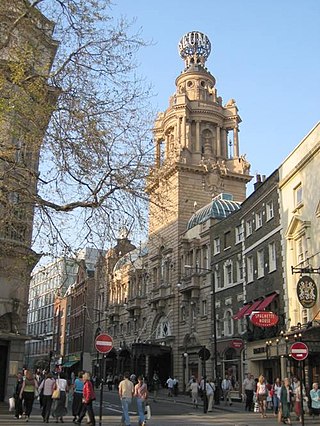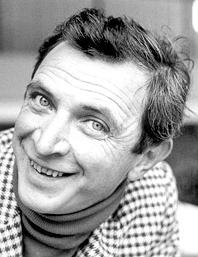Related Research Articles

Sir Colin Rex Davis was an English conductor, known for his association with the London Symphony Orchestra, having first conducted it in 1959. His repertoire was broad, but among the composers with whom he was particularly associated were Mozart, Berlioz, Elgar, Sibelius, Stravinsky and Tippett.

English National Opera (ENO) is a British opera company based in London, resident at the London Coliseum in St Martin's Lane. It is one of the two principal opera companies in London, along with The Royal Opera. ENO's productions are sung in English.

Sir Robert Murray Helpmann was an Australian ballet dancer, actor, director, and choreographer. After early work in Australia he moved to Britain in 1932, where he joined the Vic-Wells Ballet under its creator, Ninette de Valois. He became one of the company's leading men, partnering Alicia Markova and later Margot Fonteyn. When Frederick Ashton, the company's chief choreographer, was called up for military service in the Second World War, Helpmann took over from him while continuing as a principal dancer.
Welsh National Opera (WNO) is an opera company based in Cardiff, Wales. WNO gave its first performances in 1946. The company began as a mainly amateur body and transformed into an all-professional ensemble by 1973. In its early days, the company gave a single week's annual season in Cardiff, gradually extending its schedule to become an all-year-round operation, with its own salaried chorus and orchestra. It has been described by The New York Times as "one of the finest operatic ensembles in Europe".
John Arthur Lanchbery OBE was an English-Australian composer and conductor, famous for his ballet arrangements. He served as the Principal Conductor of the Royal Ballet from 1959 to 1972, Principal Conductor of the Australian Ballet from 1972 to 1977, and Musical Director of the American Ballet Theatre from 1978 to 1980. He continued to conduct regularly for the Royal Ballet until 2001.

The Royal Ballet is a British internationally renowned classical ballet company, based at the Royal Opera House in Covent Garden, London, England. The largest of the five major ballet companies in Great Britain, the Royal Ballet was founded in 1931 by Dame Ninette de Valois. It became the resident ballet company of the Royal Opera House in 1946, and has purpose-built facilities within these premises. It was granted a royal charter in 1956, becoming recognised as Britain's flagship ballet company.

Gloriana, Op. 53, is an opera in three acts by Benjamin Britten to an English libretto by William Plomer, based on Lytton Strachey's 1928 Elizabeth and Essex: A Tragic History. The first performance was presented at the Royal Opera House, London, in 1953 during the celebrations of the coronation of Queen Elizabeth II. Gloriana was the name given by the 16th-century poet Edmund Spenser to his character representing Queen Elizabeth I in his poem The Faerie Queene. It became the popular name given to Elizabeth I.
Sir Alexander Drummond Gibson was a Scottish conductor and opera intendant. He was also well known for his service to the BBC and his achievements during his reign as the longest serving principal conductor of the Scottish National Orchestra in which the orchestra was awarded its Royal Patronage.

John Cyril Cranko was a South African ballet dancer and choreographer with the Royal Ballet and the Stuttgart Ballet.

The Carl Rosa Opera Company was founded in 1873 by Carl Rosa, a German-born musical impresario, and his wife, British operatic soprano Euphrosyne Parepa-Rosa to present opera in English in London and the British provinces. The company premiered many operas in the UK, employing a mix of established opera stars and young singers, reaching new opera audiences with popularly priced tickets. It survived Rosa's death in 1889, and continued to present opera in English on tour until 1960, when it was obliged to close for lack of funds. The company was revived in 1997, presenting mostly lighter operatic works including those by Gilbert and Sullivan. The company "was arguably the most influential opera company ever in the UK".

The Opéra national du Rhin is an opera company which performs in Alsace, eastern France. It includes the Opéras in Strasbourg, in Mulhouse, where the Ballet de l'Opéra national du Rhin, also known as the Ballet Du Rhin, is based, and in Colmar, with its Opéra Studio, a training centre for young singers. Thee organisation has held the status of "national opera" since 1997.
Kent Opera was a British opera company active between 1969 and 1989. It was based in Ashford and regular venues included The Orchard Theatre, Dartford; Assembly Halls, Tunbridge Wells; Marlowe Theatre, Canterbury; Kings Theatre, Southsea; Theatre Royal,Norwich, and the Derngate, Northampton. Its operas were performed in English, usually with new translations of the libretto by professor Michael Irwin, but also by Norman Platt or Anne Riddler. For the first two years it performed with the Midland Sinfonia but later had its own orchestra.
Donald Robin Smith is an Australian operatic tenor who is known professionally as Robin Donald. He is the son of the Australian operatic tenor Donald Smith.

Anne Collins was an English contralto known as versatile operatic singer, praised for her "beautifully warm and wide-ranging timbre, and impeccable diction". In a career that spanned nearly 40 years, she sang a wide range of operatic character roles and other classical pieces, including standard opera repertory, premieres, 20th century pieces, art song and other music.

Ashley Macdonald Lawrence, was a New Zealand conductor mainly active in the UK and Germany, and particularly associated with ballet.
Opera North is an opera company based at the Grand Theatre, Leeds, England. This article covers the period between the severing of its ties with English National Opera and the departure of its founding music director David Lloyd-Jones.

John James Fryatt was an English actor and opera singer best known for his performance in comic character roles.

Dennis Drew Arundell OBE was a British actor, librettist, opera scholar, translator, producer, director, conductor and composer of incidental music who was born in Finchley and died in Camden.

Norman Walter Gwynn Tucker CBE was an English musician, administrator and translator. Trained as a concert pianist, he was invited to join Sadler's Wells Opera in 1947 in an administrative role, and from 1948 to 1966 he was the managerial head of the company.
Anthony John Elwyn Besch was an English opera and theatre director. As a young man he worked at Glyndebourne assisting the directors Carl Ebert and Günther Rennert. His first work as an opera director was for Welsh National Opera in 1954. Among other British companies with whom he worked were Opera North, D'Oyly Carte, The Royal Opera, the Aldeburgh Festival and Garsington Opera. He was most closely associated with English National Opera, Scottish Opera, and the New Opera Company.
References
- 1 2 3 4 5 Hume, Robert D, Jacobs, Arthur. "London, §II: Institutions, 1: Companies, K–N". In: The New Grove Dictionary of Opera . London & New York, Macmillan, 1997.
- ↑ Obituary for Peter Hemmings. The Daily Telegraph , 5 January 2002.
- ↑ Porter, Andrew. "New Opera Company at Sadler's Wells : A Tale of Two Cities and The Rake's Progress". Opera , vol. 8, no. 9, September 1957, pp. 586–593.
- 1 2 3 4 "In the News", Opera . March 1973, p. 202.
- ↑ "Szymanowski's King Roger". Opera . May 1975, p. 428.
- 1 2 3 Company description. Programme for Johnny Strikes Up , Sadler's Wells Theatre, London, 1984.